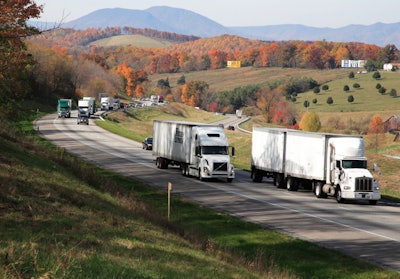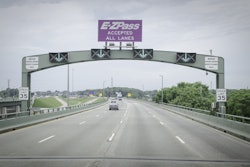 Identical bills were introduced in the Virginia House and Senate that would establish tolls on I-81 through the state. Truckers would pay a maximum of $55.25 to cross the state in one direction.
Identical bills were introduced in the Virginia House and Senate that would establish tolls on I-81 through the state. Truckers would pay a maximum of $55.25 to cross the state in one direction.Following Virginia Gov. Ralph Northam’s announcement of a tolling plan for I-81 through the state, identical bills were introduced recently in the Virginia House and Senate that would establish tolls for both trucks and cars on the 325-mile stretch of interstate.
However, the legislation leans more heavily on truck tolls and gives passenger cars options to reduce toll costs. The American Trucking Associations has threatened legal action against the state if the proposed plan goes into law, and the Alliance for Toll-Free Interstates has come out in opposition of the legislation.
Under the terms of the legislation, the initial tolls for Class 6 and higher trucks would be capped at 17 cents-per-mile, with the actual rate to be set by the Commonwealth Transportation Board if the legislation were to become law. At this rate, truckers would pay a maximum of $55.25 to cross the entirety of the state in one direction. The bill’s sponsor in the state’s senate, Sen. Mark Obenshain, said in a press release the tolls will be halved for truckers traveling between 9 p.m. and 6 a.m.
Tolls for Class 5 vehicles and smaller would not exceed two-thirds of the toll rate for heavy vehicles, or about 11 cents per mile. Toll rates under the legislation could only be adjusted every eight years.
Additionally, the legislation would establish penalties for truckers and other drivers who try to circumvent tolls. Obenshain said the bill would establish a video monitoring system and automatic vehicle identification system to monitor and penalize trucks and other vehicles that exit I-81 onto U.S. Highway 11, which runs parallel to the interstate, to avoid a toll gantry.
The bills also would establish an I-81 “annual pass” that would only be available to passenger vehicles. The pass would cost no more than the amount of a full-length round trip for Class 5 and smaller vehicles.
Light users of the interstate will be able to receive a full discount. Obenshain said there will be six toll gantries along the interstate, positioned every 50 miles. He said the bill gives one free pass through one gantry each way every day, which would give local commuters up to 200 miles of travel per day without charge. For those that travel through more than one gantry each direction per day, they could purchase the annual pass for unlimited travel on the interstate.
In a letter to Gov. Northam, the American Trucking Associations said the proposed toll scheme “discriminates against interstate commerce by favoring noncommercial vehicles over commercial vehicles.” ATA specifically names the annual pass that would be offered to passenger vehicles, noting that if a one-time payment is appropriate for a passenger car regardless of the number of trips it takes on the interstate in a year, it is at the same time “excessive for trucks to be required to pay separately for each trip.”
“We encourage you and the Assembly to think carefully about these issues before Virginia takes any further steps in the direction it appears to be heading, and to bear in mind that the auto-only annual pass option will be vulnerable to a legal challenge if it moves forward,” ATA said in its letter.
The tolling legislation was also met by resistance from the Alliance for Toll-Free Interstates. ATFI argues that all money generated to help improve the I-81 corridor needs to go toward improving the interstate rather than “spending it on collecting, administering and enforcing tolls.” The group argues that a tax increase would allow all money generated to go to improving the road, and money could be collected sooner to begin improvements quicker.
As of Jan. 24, the senate bill was passed by the state’s Senate Transportation Committee and referred to the Finance Committee. There has been no action yet on the House bill.










